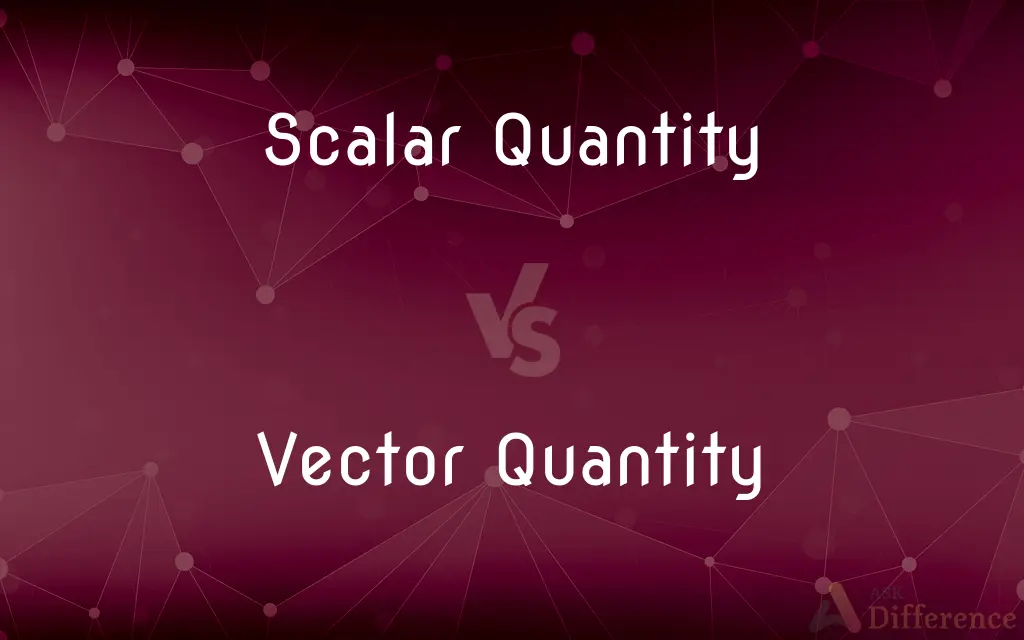Scalar Quantity vs. Vector Quantity — What's the Difference?
By Tayyaba Rehman — Published on October 22, 2023
Scalar Quantity has only magnitude, whereas Vector Quantity has both magnitude and direction.

Difference Between Scalar Quantity and Vector Quantity
Table of Contents
ADVERTISEMENT
Key Differences
Scalar Quantity and Vector Quantity are fundamental concepts in the realm of physics, distinguishing how quantities are described in terms of their properties. Scalar Quantity, as the name suggests, is quantified by a singular scalar, or number, which represents its magnitude. It lacks any specific direction. For instance, when discussing temperature, one might say it's 75 degrees. This is a Scalar Quantity as it merely states a magnitude.
Tayyaba Rehman
Oct 22, 2023
The difference between Scalar Quantity and Vector Quantity is paramount when analyzing physical phenomena. For instance, speed is a Scalar Quantity, simply detailing how fast something is moving. Velocity, on the other hand, is a Vector Quantity, as it denotes both the speed and the direction of the movement.
Tayyaba Rehman
Oct 22, 2023
Vector Quantity, however, adds another layer of complexity. While it does have a magnitude, just like Scalar Quantity, it also has a specified direction. The force exerted on an object, for example, is a Vector Quantity. It's not enough to say a force of 5 Newtons; one must also specify in which direction this force is applied for a full understanding.
Tayyaba Rehman
Oct 22, 2023
It's crucial to understand the distinction between Scalar Quantity and Vector Quantity, especially in fields that involve calculations or analyses relating to movement, forces, or other directional phenomena. Recognizing whether a quantity has direction or not will greatly influence the mathematical and conceptual approach to a problem.
Tayyaba Rehman
Oct 22, 2023
Comparison Chart
ADVERTISEMENT
Mathematical treatment
Generally simpler
May require vector calculus or algebra
Tayyaba Rehman
Oct 22, 2023
Definitions
Scalar Quantity
A measurement that lacks directional information.
Temperature, being a Scalar Quantity, doesn't indicate any direction.
Tayyaba Rehman
Oct 02, 2023
ADVERTISEMENT
Vector Quantity
Often requiring vector mathematics for computations.
Acceleration, being a Vector Quantity, requires a specific direction.
Tayyaba Rehman
Oct 02, 2023
Scalar Quantity
Singular numerical values representing physical quantities.
Distance traveled is a Scalar Quantity.
Tayyaba Rehman
Oct 02, 2023
Vector Quantity
A quantity possessing both magnitude and direction.
Velocity is a Vector Quantity since it describes speed and direction.
Tayyaba Rehman
Oct 02, 2023
Scalar Quantity
Any quantity where direction is irrelevant.
Time is a Scalar Quantity as it doesn't have a directional component.
Tayyaba Rehman
Oct 02, 2023
Vector Quantity
A descriptor that always needs both magnitude and direction.
Momentum is a Vector Quantity, always having direction and magnitude.
Tayyaba Rehman
Oct 02, 2023
Scalar Quantity
A physical quantity defined only by its magnitude.
Mass is a Scalar Quantity as it only denotes the amount of matter.
Tayyaba Rehman
Oct 02, 2023
Vector Quantity
Represented graphically by arrows.
Magnetic fields are typically represented as Vector Quantity arrows.
Tayyaba Rehman
Oct 02, 2023
Scalar Quantity
A descriptor that doesn't need directional specification.
The energy in a system is a Scalar Quantity.
Tayyaba Rehman
Oct 02, 2023
Vector Quantity
Physical measurements that require directional specificity.
Force applied to an object is a Vector Quantity.
Tayyaba Rehman
Oct 02, 2023
FAQs
What is Scalar Quantity?
Scalar Quantity is a measurement that has only magnitude and lacks direction.
Tayyaba Rehman
Oct 22, 2023
Can Scalar Quantities be negative?
Yes, Scalar Quantities can be negative, but it indicates a value below a reference point, not a direction.
Tayyaba Rehman
Oct 22, 2023
How does Vector Quantity differ from Scalar Quantity?
Vector Quantity possesses both magnitude and direction, while Scalar Quantity only has magnitude.
Tayyaba Rehman
Oct 22, 2023
How are Vector Quantities graphically represented?
They are usually represented by arrows, where the length indicates magnitude and the arrow points in the quantity's direction.
Tayyaba Rehman
Oct 22, 2023
Is weight a Scalar Quantity or Vector Quantity?
Weight is a Vector Quantity as it has a magnitude and acts downward due to gravity.
Tayyaba Rehman
Oct 22, 2023
Is speed a Scalar Quantity or Vector Quantity?
Speed is a Scalar Quantity as it only represents how fast something is moving without direction.
Tayyaba Rehman
Oct 22, 2023
Which quantity, Scalar or Vector, requires direction?
Vector Quantity requires a specific direction.
Tayyaba Rehman
Oct 22, 2023
Why do Vector Quantities require more complex mathematics?
Because they involve calculations in multiple dimensions due to their directional nature.
Tayyaba Rehman
Oct 22, 2023
Why is direction important in Vector Quantities?
Direction in Vector Quantities provides essential information about how and where the force or motion is applied.
Tayyaba Rehman
Oct 22, 2023
Is volume a Scalar or Vector Quantity?
Volume is a Scalar Quantity as it only has magnitude.
Tayyaba Rehman
Oct 22, 2023
Is time a Vector or Scalar Quantity?
Time is a Scalar Quantity as it progresses forward without a specific direction.
Tayyaba Rehman
Oct 22, 2023
How can one differentiate between Scalar and Vector quantities in equations?
Scalar Quantities are usually represented by simple numbers, while Vector Quantities might be denoted by bold letters or arrows above them.
Tayyaba Rehman
Oct 22, 2023
Author Spotlight
Written by
Tayyaba RehmanTayyaba Rehman is a distinguished writer, currently serving as a primary contributor to askdifference.com. As a researcher in semantics and etymology, Tayyaba's passion for the complexity of languages and their distinctions has found a perfect home on the platform. Tayyaba delves into the intricacies of language, distinguishing between commonly confused words and phrases, thereby providing clarity for readers worldwide.

















































